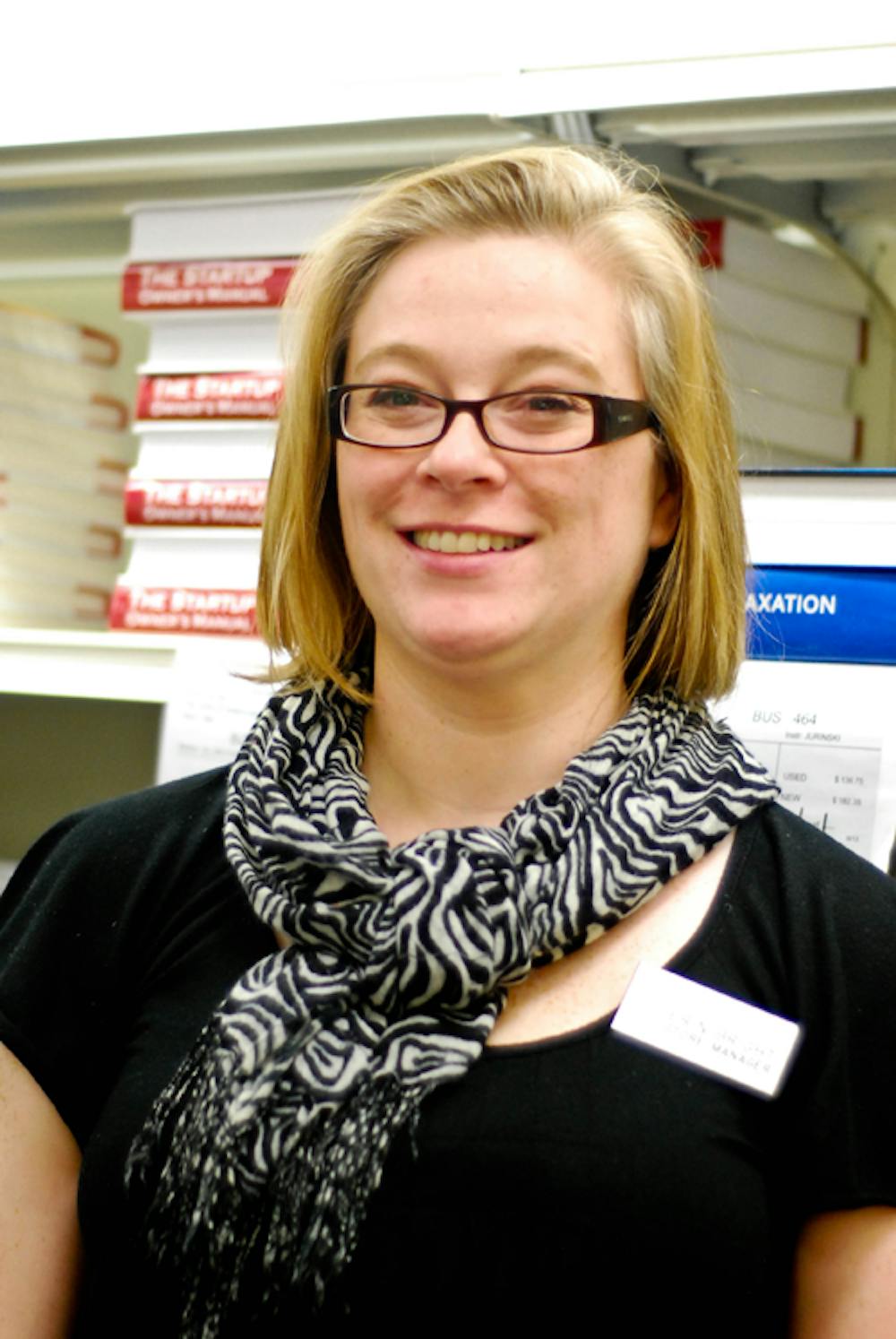High textbook prices prompt students, faculty and the campus bookstore to be resourceful
Freshman Max Robinson owns many expensive textbooks as a computer science and mathematics major. Students are discovering alternative ways to buy and sell textbooks to save money. (Jackie Jeffers | The Beacon)
By Kathryn Walters, Staff Writer walters14@up.edu
Every semester, junior Julia Sheets sees a consistent $500 to $800 drop in her bank account.
Her hard-earned money from peer-leading a physics lab goes toward purchasing textbooks.
"I don't understand why it costs so much," Sheets said. "I just try to block it out of my head and get on with my semester."
According to a national study conducted through the National Association of College Stores last year, students estimated they spent $655 annually on required course materials. One approach students can take to reduce how much they spend is through renting books.
Erin Bright, UP's textbook manager, said students rented almost 3,000 individual books this past fall, 1,000 more than last year.
"I guess sometimes it's cheaper to rent, but if you know you'll be able to sell back the book, it's usually cheaper to buy used and then sell it back," junior and elementary education major Kristin Hortsch said.
The steep prices of textbooks and time considerations can prevent students from reading their books or even buying them at all.
"I have a bad habit of tending to not read my textbooks because I learn better from lecture, so unless something is required, I tend not to open or read my textbook," said freshman computer science and mathematics major Max Robinson.
Hortsch said she once took a class and didn't buy the required textbook because students who had taken the class before her said she wouldn't need it.
"Sometimes professors do a terrible job of picking textbooks that are just a waste of time to read," she said.
However, the possibility of getting money back on books causes some students to buy their books rather than rent.
"I wanted to see if I could get a better return for them as opposed to just renting and not getting any return for them," Robinson said. "I was hoping to sell them to people at UP who might take the same classes next, or to try to sell through some third party site."
At the end of the semester, UP students must decide what to do with old textbooks. The campus bookstore offers a buy-back program, or students can sell to other students or online.
Sheets found she could get a better return for her used books online.
"Once with my surveying book, I think I got $100 on Amazon for it, and I don't think they would have given me much at the bookstore," she said.
In some cases, students choose to keep their major-specific textbooks.
"Some of my math and computer science textbooks I do plan on keeping for reference in case there isn't something in my notes," Robinson said.
Sheets decided to keep some of her textbooks she thinks will still be useful.
"My friend said she was going to keep her books, and that was a new concept for me because usually I buy them, then sell them back for money," she said. "I'm planning on keeping a few of the ones I feel are useful."
Professors use different
teaching tools
In light of high textbook prices, some professors take price into consideration when assigning course materials.
"My decision is based on 75 percent content, 25 percent cost," sociology professor Bryan Rookey said. "I try to save students money by using older editions so they can explore the market."
Instead of assigning expensive books, Bradley Franco, history professor, takes advantage of other options, such as course readers from the print shop, online reserves and Moodle.
"My focus in all my classes is on getting students engaged in primary source materials," he said. "Although students don't like to have to print out all the materials, so there's that consideration."
Theology professor Rev. Thomas Hosinski assigns textbooks for his intro-level theology courses, but for an upper division class, he wrote his own book of readings.
"To get everything that I wanted, I would have had to assign eight books," he said.
Bookstore seeks to help students save money
The bookstore offers more than rental and buy-back programs to help students save money.
E-books are an option for some textbooks from the bookstore. According to Bright, they can cost about 60 percent less than a new textbook.
But, they are only accessible through a laptop or PC and the no-refund policy could affect students' decisions to try them out.
"Right now, given the choice, students will rent the book over getting an e-book or purchasing new or used," Bright said.
Besides rentals, Bright said students can better their chances of saving money by ordering books as soon as possible, and checking with professors themselves whether they will use the same textbooks the following semester.
Bright also works with students to decide whether a course material they might need is actually necessary, like a $200 "recommended" nursing textbook.
"I tried to tell the students who were ordering it ahead of time, you probably won't need this," she said. "I don't want them to spend the money if they don't need to."
Erin Bright, manager of UP bookstore, is working to help students save money through textbook renting and E-books. (Jackie Jeffers | The Beacon)








